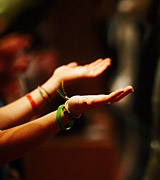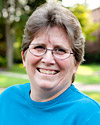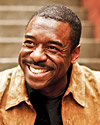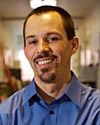Being Faithful
How SPU Ministers to Students
By Beth Douglass
 Seattle Pacific offers a variety of opportunities for students to explore and stretch their faith. Of course there are official programs and departments set up for ministry, but just as often such ministry happens with professors or in a classroom setting.
Seattle Pacific offers a variety of opportunities for students to explore and stretch their faith. Of course there are official programs and departments set up for ministry, but just as often such ministry happens with professors or in a classroom setting."Coffee and a Big Brown Couch": Mentorship
For Bob Zurinsky, being a campus pastor at Seattle Pacific University is all about the relationship with students. It's a conviction that his colleagues, Stephen Newby and Deb Nondorf, also share.
"I meet personally with dozens of students every week," says Zurinsky, assistant director of the Center for Worship. "That can be anything from chatting and catching up to working with current issues in their lives where they need more support."
 Nondorf, a minister of Christian community formation, has a big brown couch in her office, and she says there is almost always a student sitting on it. For Newby, the director of University Ministries and the Center for Worship, his interactions with students often involve "a lot of lunch meetings, a lot of cups of coffee, a lot of prayer."
Nondorf, a minister of Christian community formation, has a big brown couch in her office, and she says there is almost always a student sitting on it. For Newby, the director of University Ministries and the Center for Worship, his interactions with students often involve "a lot of lunch meetings, a lot of cups of coffee, a lot of prayer."
Zurinsky says many faculty and staff members also have mentoring relationships with students.
Professor of Educational Ministry Ed Smyth has led a discipleship group of SPU men for a total of 24 years.
Once a week, the group of about 12 men gathers in Smyth's home for sharing, accountability, prayer, and Bible study.
"I want to be part of a university experience where I am challenging my students both academically and spiritually," he says. "I think all Seattle Pacific University students need to be challenged heart, mind, and soul."
"A Vibrant Culture": Worship and Ministry
 In addition to mentoring faculty relationships, there are formal ministry programs. Newby leads the campus men's ministry, while Nondorf guides a similar program for women students.
In addition to mentoring faculty relationships, there are formal ministry programs. Newby leads the campus men's ministry, while Nondorf guides a similar program for women students.
This women's ministry is known as Anam Chara – a Gaelic phrase meaning "soul friend" – stirring up images of one person walking alongside and supporting another.
Nondorf has also taken women on multiple spiritual and vocational discernment pilgrimages to Scotland's Isle of Iona.
"SPU has a vibrant Christian culture," Zurinsky says. "That's an exceptional statement for a school with open enrollment, where students are not required to ascribe to any particular faith."
On-campus ministry programs might be optional, but they still attract nearly 1,000 student participants every week. This includes small groups and weekly worship service attendance.
Newby brings a love of worship arts to his role as a campus pastor — which makes sense, considering that he's also an SPU music professor and conducts the Gospel Choir and Worship Arts Ensemble. He organizes campus gospel concerts and worship workshops, but also helps bring different styles of music to the weekly services.
"We're really looking to bring more multiethnic worship expressions to the forefront," Newby says.
"Beyond the Campus": Volunteering
 Each summer, about 50 students jet off around the globe to build, teach, or serve during one of the SPRINT program's multiweek mission trips. Closer to home, two other groups offer ways to volunteer in Seattle and with local communities.
Each summer, about 50 students jet off around the globe to build, teach, or serve during one of the SPRINT program's multiweek mission trips. Closer to home, two other groups offer ways to volunteer in Seattle and with local communities.
The service group Latreia paints houses, serves meals, or clears invasive plants during quarterly volunteer days. For students wanting to become more involved in local community development, Urban Involvement sends teams to 13 different volunteer locations every week.
This could include tutoring a child in algebra, working with the homeless, playing with children at Seattle's Union Gospel Mission, or leading youth Bible studies in a low-income neighborhood.
"It's important to get students out into those settings to develop a bigger picture of what the world is like and what God is doing in the world," says Owen Sallee, coordinator for global and urban involvement. "Quite often, the communities are quite different from what our students grew up with."
Sallee also leads a weekly small group for Urban Involvement's 18 student leaders, many of whom often feel frustrated by the cycle of injustice and poverty they see while volunteering.
Sallee doesn't think of it as his job to provide answers, but to listen to students' stories and ask questions that prompt more thinking.
"We're able to help them navigate the self-discovery process, debriefing and helping them make sense of the things they're seeing," he says.
After students are ministered to, many go on to guide and mentor their peers. Coming up in October 2010, we'll take a look at how students at SPU minister to other students.
View Feature Story Archives


